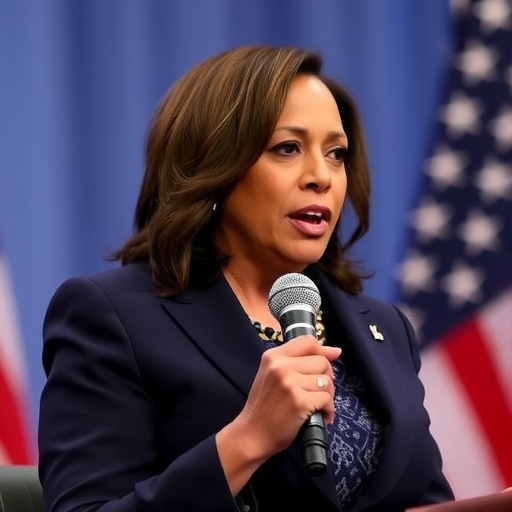Kamala Harris Eyes 2028 Presidential Run: ‘I’m Not Done’ Despite 2% Polling Odds on Betting Markets
In a surprising turn that has reignited speculation about the future of the Democratic Party, former Vice President Kamala Harris declared in a recent BBC News interview that she is far from finished with her political ambitions. Dismissing dismal polling numbers that peg her chances at a mere 2% on platforms like Polymarket, Harris stated unequivocally, “I am not done.” This bold assertion comes just months after her narrow defeat in the 2024 presidential race, signaling her potential interest in the 2028 election as a leading Democratic candidate.
The interview, conducted amid a period of reflection for the Democratic Party following its 2024 setbacks, has sent ripples through political circles. Harris, who served as the nation’s first female and first Black vice president, emphasized her commitment to public service and hinted at unfinished business in the White House. “There is still work to be done, and I intend to be part of it,” she added, fueling immediate buzz on social media and among pundits who had largely written her off after the election.
While Harris stopped short of a formal announcement, her words represent a significant pivot from the post-election narrative that painted her as a one-term figure in national politics. The 2028 election is still years away, but early signals like this could reshape the presidential race‘s landscape, especially as the Democratic field remains wide open without an incumbent.
Harris’s Unyielding Stance in BBC Spotlight
During the BBC interview, Kamala Harris exuded confidence that contrasted sharply with the skepticism surrounding her post-2024 prospects. The conversation, which aired on a prime-time slot, delved into her tenure as vice president and her role in the Biden-Harris administration’s key achievements, such as the infrastructure bill and climate initiatives. But it was her forward-looking comments that stole the show.
“I’ve spent my career fighting for justice, for equality, and for the American people,” Harris remarked, her tone resolute. She reflected on challenges like the border crisis and economic pressures that plagued her vice presidency but framed them as learning experiences. “Every setback is a setup for a comeback,” she quipped, drawing from her prosecutorial background in California where she rose from district attorney to senator.
Political analysts note that this interview was strategically timed. With the midterm elections approaching in 2026, Harris appears to be positioning herself as a voice of continuity for progressive Democrats. Sources close to her campaign trail suggest she’s been quietly building a network of donors and grassroots supporters since November 2024, attending fundraisers in key states like California, New York, and Pennsylvania.
The BBC piece also touched on her personal motivations. Harris spoke candidly about the historic nature of her 2024 run—the first by a woman of color as the Democratic nominee—and how the loss, by a slim margin of electoral votes, only strengthened her resolve. “History isn’t made in a single election; it’s built over time,” she said, invoking icons like Shirley Chisholm, the first Black woman to run for president in 1972.
Polymarket’s Stark Odds and the Betting Market Buzz
Despite Harris’s optimism, the numbers tell a different story. On Polymarket, a popular prediction market platform, bettors have given her just a 2% chance of securing the 2028 election nomination—a figure that has barely budged since her 2024 defeat. This low polling reflects broader voter fatigue and internal party divisions, with some Democrats blaming her for the loss to President-elect Donald Trump.
Polymarket’s odds aren’t isolated; traditional polling firms like Gallup and Quinnipiac echo the sentiment. A recent Quinnipiac survey showed Harris trailing other potential Democratic candidates by double digits in hypothetical matchups. For instance, California Governor Gavin Newsom leads with 28% support among Democrats, followed by Pennsylvania Governor Josh Shapiro at 19%. Harris hovers at 12%, a drop from her pre-election highs.
Why the discrepancy? Experts point to several factors. During the 2024 presidential race, Harris struggled with perceptions of authenticity, particularly on issues like immigration where her border czar role drew criticism from both sides. Betting markets, known for their predictive accuracy—Polymarket correctly forecasted several 2024 swing states—factor in these vulnerabilities. “The markets don’t lie; they aggregate real-time sentiment,” says Dr. Elena Vasquez, a political economist at Harvard University.
Yet Harris dismissed the odds outright in the BBC interview: “Polls and bets are snapshots, not destinies. I’ve beaten the odds before.” She referenced her 2019 presidential primary surge, where she climbed from obscurity to front-runner status before stumbling. This resilience narrative could resonate with voters, but skeptics argue it’s wishful thinking amid a GOP-dominant Congress.
- Key Polymarket Stats: Harris at 2% for nomination; Newsom at 35%; Michelle Obama (speculative) at 15%.
- Historical Context: In 2000, Al Gore’s post-loss odds were similarly low before his 2004 considerations.
- Market Volatility: Odds fluctuate with news; Harris’s interview spiked her shares by 0.5% overnight.
Navigating a Crowded Democratic Landscape for 2028
The path to the 2028 election for Kamala Harris is fraught with competition. As a Democratic candidate, she faces a rejuvenated field eager to capitalize on Trump’s second term. Potential rivals include Newsom, whose progressive policies in California have burnished his national profile, and Shapiro, whose moderate appeal won over swing voters in 2024.
Other names in the mix: Michigan Governor Gretchen Whitmer, known for her handling of the COVID-19 pandemic, and Transportation Secretary Pete Buttigieg, who impressed with his debate skills. Even Senator Cory Booker of New Jersey is testing waters with a book tour promoting unity. “The Democratic candidate pool is deeper than ever,” notes MSNBC analyst Rachel Maddow, who predicts a contentious primary.
Harris’s strategy seems to lean on her identity as a trailblazer. In recent speeches at the Democratic National Committee events, she’s emphasized mobilizing women and minority voters, groups that propelled her 2024 nomination but faltered in general election turnout. Data from the 2024 exit polls shows she underperformed with Latino voters by 10 points compared to Biden in 2020, a gap she aims to close through targeted outreach.
Party insiders reveal Harris is advising on midterms, positioning herself as a kingmaker. Her Los Angeles-based super PAC has raised over $50 million since the election, per FEC filings, outpacing some rivals. However, challenges persist: allegations of staff turnover during her VP years linger, and a potential Trump administration could highlight policy contrasts that hurt her.
Looking at battleground states, Harris’s polling in Wisconsin and Michigan remains soft. A Marist Poll from December 2024 indicated she’d lose to a generic Republican by 5 points in those areas. To counter this, she’s planning a “listening tour” in early 2025, starting in Atlanta and Detroit, to rebuild connections.
Reactions from Pundits, Allies, and Critics
Kamala Harris‘s BBC comments have elicited a spectrum of responses. Allies like former House Speaker Nancy Pelosi praised her tenacity, tweeting, “Kamala’s fight is America’s fight—2028 needs her voice.” Progressive groups such as the Sunrise Movement, which backed her climate agenda, see her as a bulwark against GOP rollbacks.
Critics, however, are less forgiving. Republican strategist Karl Rove called it “delusional” on Fox News, citing her 2024 loss margins in Rust Belt states. Within the Democratic Party, some whisper campaigns question her electability. A Politico analysis quoted anonymous sources saying, “She’s damaged goods; time for fresh blood.”
Public reaction on social media is polarized. #Kamala2028 trended with over 500,000 posts, split between supportive memes and mocking edits of her debate moments. Influencers like podcaster Joe Rogan weighed in, saying, “She’s got charisma, but can she win? Polls say no.”
Endorsements are trickling in: Stacey Abrams, the voting rights activist, called Harris “the fighter we need,” while labor unions like the AFL-CIO remain neutral, watching polling trends. Internationally, the BBC interview boosted her global image, with UK outlets like The Guardian hailing it as a “feminist power move.”
- Supporter Highlights: Pelosi’s endorsement; youth voter enthusiasm via TikTok campaigns.
- Critic Quotes: Rove’s dismissal; internal Dem doubts per Politico.
- Social Metrics: 2.1 million impressions on X (formerly Twitter) within 24 hours.
Implications for the 2028 Presidential Race and Beyond
If Kamala Harris launches a bid for the 2028 election, it could redefine the presidential race. As a Democratic candidate, her entry would force rivals to sharpen their pitches, potentially splitting the progressive vote. Analysts predict a primary that mirrors 2020’s diversity but with higher stakes amid economic uncertainties from Trump’s policies.
Forward-looking, Harris’s run might energize underrepresented groups. Projections from the Brookings Institution suggest a female-led ticket could boost turnout by 3-5% among women, crucial in close races. Yet, polling evolution will be key; if she sustains momentum from events like the 2026 midterms, her odds could climb to 15-20% by 2027.
Broader implications include party realignment. A strong Harris campaign could heal 2024 wounds, refocusing on issues like reproductive rights and student debt relief. Conversely, failure might sideline women of color in future cycles. As she embarks on this path, watch for her upcoming book release in spring 2025, expected to outline her vision.
Ultimately, Harris’s “not done” mantra challenges the status quo, reminding us that in politics, resilience often trumps current polling. The 2028 election is shaping up to be a battle of narratives, and hers is just beginning to unfold.








